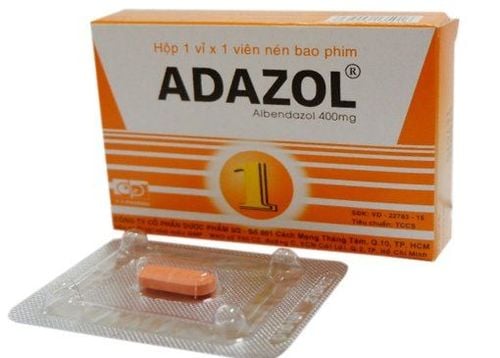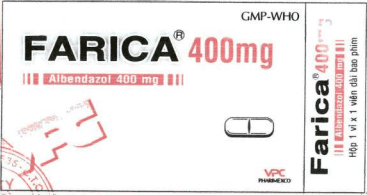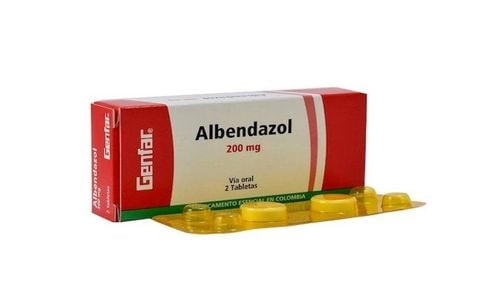Parasitic helminths can harm the host's body, that’s why it is advisable to deworm every six months. However, many people are uncertain about when to take deworming medicine. This article aims to provide essential information on the best timing for taking deworming medication to achieve the most effective results.
1. When is the best time to take deworming medicine?
Helminths are parasites that inhabit and feed on the intestines. In our country, inadequate environmental sanitation, along with poor food hygiene and safety practices, has led to widespread helminth infections among the population. Both children and adults can be infected, particularly through consumption of contaminated food or water or direct contact with infected surfaces (dust or flies). Due to poor environmental sanitation and food hygiene, many individuals are affected by various types of helminths, including roundworms, whipworms, pinworms, hookworms, and eelworms…
The rate of infection with worms, particularly roundworms, is very high. Adults often become infected with roundworms by eating uncooked food or drinking water that contains worm eggs, or food that is contaminated by dust, flies, or cockroaches.
In children, in addition to roundworm infections, they are also vulnerable to pinworm infections due to their tendency to play in dirt and sand that may contain worm eggs. Additionally, pinworms can cause itching as worm lay eggs on the anus, leading children to scratch the anus and subsequently put their hands in their mouths, thereby swallowing more worm eggs. Prolonged infections can result in complications such as malnutrition, anemia, iron deficiency, or liver and lung diseases.
Pregnant women infected with worms are at a high risk of having a malnourished fetus or one that develops slowly.
Currently, the market offers two primary active ingredients: mebendazole and albendazole. Mebendazole is generally considered easier to use. It works by inhibiting helminths' ability to absorb nutrients. This is a non-prescription drug, allowing people to self-treat for themselves and their families. It is advisable to undertake deworming every 4 to 6 months.
1.1. Dosage of Deworming Medication Mebendazole is considered safe, and the dosage for both adults and children over the age of 2 is the same. For each deworming session, you only need to take a single 500mg pill to get rid of all common types of worms.
1.2. Optimal Timing for Taking Deworming Medication Many people inquire about the best time to take deworming medication. It can be taken at any time of day, morning, noon, or evening, and it can be taken on either an empty or full stomach. Unlike traditional deworming medicines, there is no need to fast from food and water.
To minimize the risk of mild side effects (though they are rare), such as dull abdominal pain or nausea, it is advisable to take the medicine after breakfast. However, for optimal effectiveness in eliminating worms, it is recommended to take it either 2 hours after dinner or early in the morning on an empty stomach.
Note: Deworming medication is not recommended for children under 2 years old or for pregnant women, especially during the first trimester. If planning pregnancy, deworming should be done at least three months in advance.
2. Take deworming medicine properly
- When dealing with a helminth infection, it is important to deworm regularly. For adults and children over the age of 2, it is recommended to deworm 2 to 3 times a year, approximately every 4 to 6 months. For children under 2 years old who are suspected of having a worm infection, it is advisable to consult a doctor and adhere to their recommendations for appropriate deworming.
- Regular deworming is essential for reducing or eliminating helminths in the intestines. During each deworming session, it's best to treat all family members to prevent cross-infection.
- For deworming medication, opt for one containing either Albendazole or Mebendazole, as these active ingredients have a broad spectrum of effectiveness against various types of helminths. Being non-prescription drugs, they can be readily obtained at pharmacies.
- When should you take deworming medicine? Modern deworming medications do not require users to take them on an empty stomach, allowing for flexibility in timing. However, the optimal times to take them are either early in the morning on an empty stomach or around two hours after dinner.
- After taking the medication, it is important to monitor your body's reactions for at least one day. If you experience symptoms such as abdominal pain, nausea, fatigue, headache, or hives,... you may be allergic to one of the drug’s ingredients. In such cases, it’s advisable to rest. If these symptoms gradually decrease, there’s usually no cause for concern. However, if you experience more severe reactions like fever, increased fatigue, or vomiting, you should seek medical attention immediately.
- Deworming medications should not be administered to pregnant or breastfeeding women, children under two years old, Patients with liver failure, bone marrow poisoning, or anyone with a history of hypersensitivity to the medication's ingredients.
- To prevent reinfection with helminths, users should practice good personal hygiene and maintain a clean living environment. This includes controlling pests like flies, mosquitoes, and cockroaches, consuming clean and well-cooked food, and washing hands before each meal
3. Signs that it is time to deworm
If you notice the following symptoms in yourself or your family members, particularly in children, it may be time to consider deworming:
- Frequent abdominal pain, especially around the navel, along with loose or hard stools.
- A noticeable loss of appetite, skipping meals, weight loss, persistent fatigue, and paleness.
- Children have difficulty achieving deep sleep, frequent night crying, and a large and firm abdomen. In particular, one of the most indicative signs of a pinworm infection is anal itching.
4. Who needs deworming
- Both adults and children can be affected by helminths; however, children are generally at a higher risk.
- Due to their carefree nature and less awareness of personal hygiene, children are particularly vulnerable to pinworm infections from families, kindergartens, and preschools. Living in areas with contaminated water sources, poor sanitation, and the habit of walking barefoot increases the likelihood of children contracting hookworms, roundworms, and whipworms.
- Additionally, children who have a habit of sucking on their fingers without washing their hands face a higher risk of pinworm infection compared to those who do not engage in this behavior.
To arrange an appointment, please call … or make your reservation directly HERE. You may also download the MyVinmec app to schedule appointments faster and manage your reservations more conveniently.













